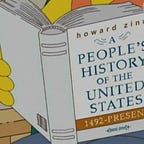A People’s Green New Deal by Max Ajl
The way things are going the city of Venice will be totally underwater by the year 2030! This is a bit of an exaggeration but I hope it alarmed some of you as the climate crisis is something worth paying attention to. Climate change is even more important than daily underpant change but although there is greater discussion about tackling the environmental impact we wretched apes have had on this whirling rock we live on, the solutions put forward are consistently ineffective or detrimental. This book was a breath of fresh air, it outlines the currently proposed models, their benefits and disbenefits compared to other suggestions, and most importantly the author offers a cohesive set of policies as an alternative to the usual lukewarm slop served up by our politicians.
What is the key difference between the author’s ideas and those of policymakers? Ajl’s ideas make greater attempts to engage and support the people! This is integral not just because we all deserve a better life, free from the threat of impending environmental doom, but also because without popular support a better life is not possible. Legislation is pointless without movements with the will and ability to do something different. My major conclusion from the book was that to make meaningful changes fresh new policies are not enough (I’m bored of attempting to do social democracy), we need a completely different system that the majority can work with, rather than against. I won’t prattle on about why a socialist system is the viable antidote to the mess we are in, to an extent the book does that for me. Although most mainstream “Green New Deals” are touted as being somewhat “progressive”, they embrace capitalism and try to make it green. This doesn’t work very well as the system can only be maintained through exploitation and, more often than not, using the Earth’s gifts to maximise profits. Capitalism cannot solve the problems it causes. More electric cars is not a good thing if it only occurs due to robbing other nations of their lithium.
Red is Green but Green isn’t necessarily Red if the Green New Deal (we should think of a better name for it!), environmental legislation needs to be (but often isn’t) grounded in material analysis wherever it is implemented. I feel the book offers several gems on how this can be done and what it could look like to make the world a tad more hospitable. After dissecting the book I broke down the key categories that must be addressed by an effective form of environmental justice into Land, Labour and Liberation.
Land must be redistributed so people can produce for themselves and based on industrial capacity and natural resources production could be specialised to curb the damaging excess we have become used to, in favour of meeting the wider population’s needs to offer richer lives to all. Labour would become useful work that helps to create and maintain a sustainable world we can be proud of. We would also get a chance to enjoy this world if we cut labour down to its essentials, with fewer hours of work being required and a greater emphasis on being part of a society where everyone is valued and enjoys the fruits of their labour.
For any of this to occur it would require Liberation for the “Global South” in particular. The green legislation put forward by the likes of Alexandria Ocasio-Cortez/Ed Markey and Bernie Sanders tends to focus on solving problems in the North, but they do so by offsetting certain issues which maintain an exploitative, neo-colonial power dynamic. Morally this is clearly unacceptable and additionally, the world does not become safer by putting the problem out of your immediate view. countries that have been exploited for so long should immediately be released from the austerity policies of The World Bank and International Monetary Fund, in favour of developing sustainable industry and trade relations that benefit the people of a country rather than the businesses.
There were so many inter-connected issues discussed within these pages and my ramblings barely scratch the surface. The topic is of an urgent nature and this book for me has initiated discussions for me to explore and ponder. I consider this a key purpose of all literature I digest and this book aims to inform whilst also helping me to develop my own viewpoint on issues that will be with us for a long time.
